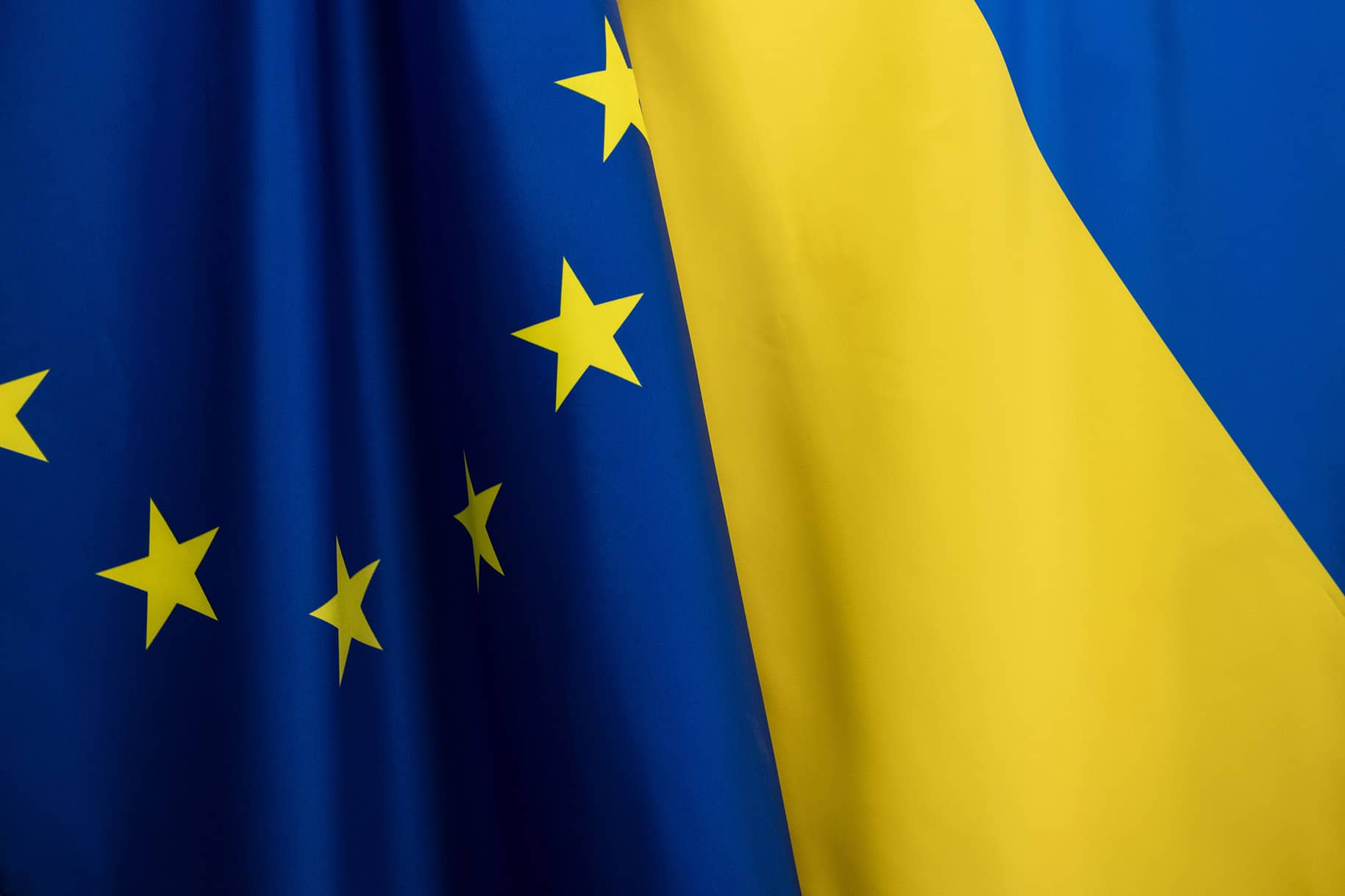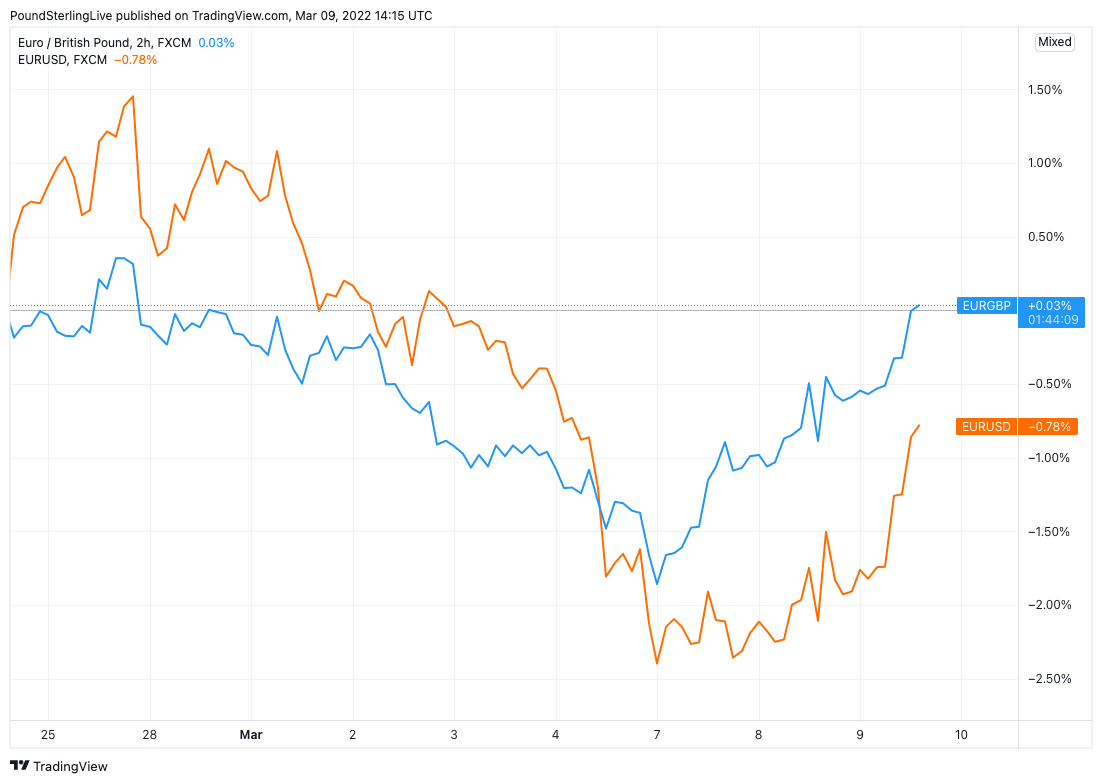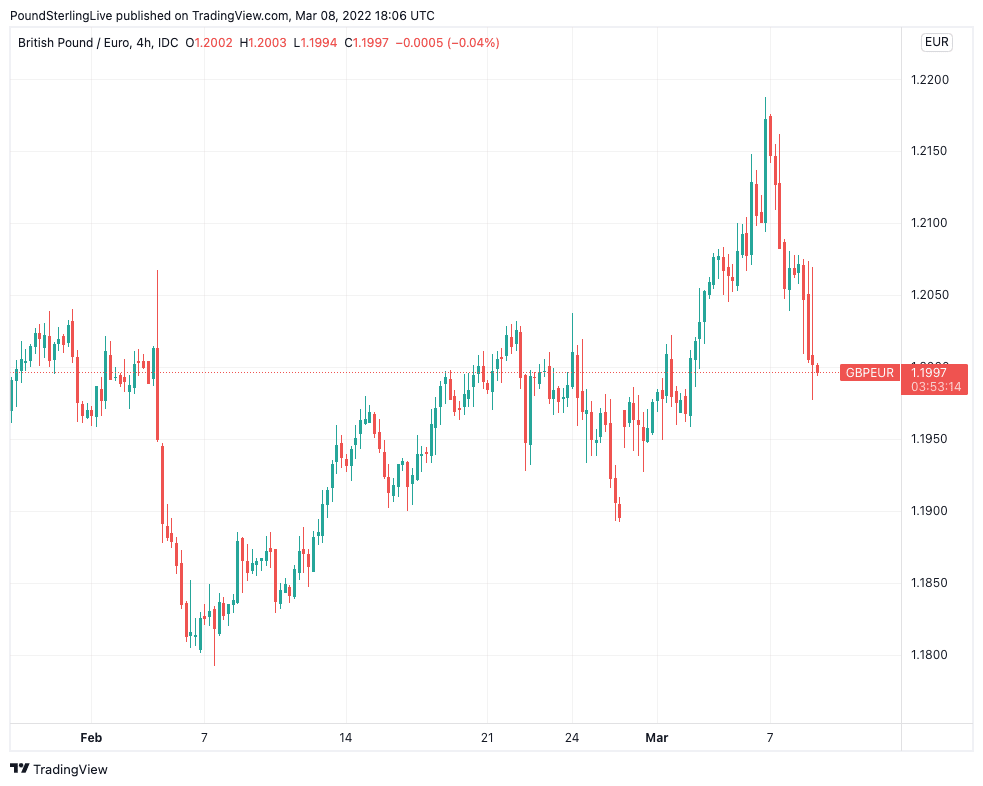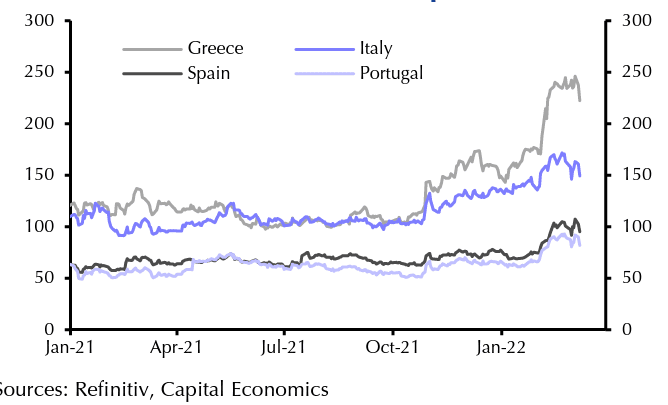The Euro Surges
- Written by: Gary Howes
- EUR bid on improved sentiment
- And news of joint EU bond issuance
- Aimed at funding defence, energy crisis
- But some doubt this is a turning point for EUR

Image: Photographer: Lukasz Kobus, European Union, 2022, Copyright. Source: EC - Audiovisual Service.
Euro exchange rate rallied into the midweek session on an improved global investor backdrop and news that European countries could issue a joint bond to finance both new defence spending commitments and the regions energy crisis.
Stock markets are rallying, signalling a turn for the better in risk sentiment.
Given the Euro has been a major underperformer during the Ukraine war it stands that it would be a winner when sentiment improves.
Investors appear to be hopeful Thursday's meeting between Russia's Sergey Lavrov with Ukrainian negotiators in Turkey can result in progress towards an end to hostilities.
Ahead of the meeting the AFP newswire reports that Russia says "some progress being made in talks with Ukraine".
Newswires meanwhile report on Wednesday afternoon Ukrainian President Volodymyr Zelensky's Deputy Chief Of Staff as saying Ukraine is ready for a diplomatic solution to ending the war.
Above: Euro vs. the Pound (blue) and Dollar (orange) since Russia invaded Ukraine.
- Reference rates at publication:
GBP to EUR: 1.2093 - High street bank rates (indicative): 1.1770 - 1.1854
- Payment specialist rates (indicative): 1.1984 - 1.2033
- Find out more about specialist rates and service, here
- Set up an exchange rate alert, here
Aiding sentiment towards the Eurozone is news the EU Commission is reportedly set to announce plans that will see EU countries jointly issue bonds "on a potentially massive scale to finance energy and defence spending".
Further details could be announced at Thursday's European Council meeting.
Issuing a joint bond presents an united front by EU countries to meet what is seen by leaders as a potentially existential challenge posed by Russia and is judged by markets to be supportive of the Euro, say analysts.
"The prospect of a new wave of joint bond issuance by the EU has helped lift the mood in market," says Daragh Maher, Head of Research, Americas, at HSBC.
Maher says the news has lent a "risk on" tone to the market, one which has allowed the Euro to rise gain against the U.S. Dollar, British Pound and other major currencies.
Above: GBP/EUR has slipped back below 1.20 as investor sentiment improves.
The Euro recovered from lows near $1.08 reached at the start of the week to trade back at 1.0927, the Euro to Pound exchange rate recovered from its lowest levels since 2016 near 0.8202 to 0.8316 (Pound to Euro back at 1.2023, having been as high as 1.2188).
Retail rates for international payments have therefore slid back into the 1.16-1.1770 region for bank accounts, independent providers are quoting towards 1.1930.
Confirmation of a plan to jointly issue debt to fund spending on defence and energy could be made public at Thursday's meeting of the European Council where leaders are to discuss the ongoing war in Ukraine.
"A significant upgrade in military spending will also be needed (an additional 0.5% of GDP per annum in the EU just to get to the NATO targets) while the investment effort needed for the energy transition will need to be accelerated to reduce dependence on Russian gas," says Gilles Moec, Group Chief Economist at AXA Investment Managers.
In the wake of the news the spread between the yield paid on 10-year Italian and German bonds tightened 11 basis points to around 150 basis points, making for its biggest drop since 2020.
The spread between German and Italian debt is widely considered a gauge of investor sentiment on the Eurozone itself, which tends to widen during times of stress.
Above: Ten-year bond yield spread between select peripheral EZ countries over German bonds. Image courtesy of Capital Economics.
Secure a retail exchange rate that is between 3-5% stronger than offered by leading banks, learn more.
"The headlines prompted an immediate change with European equities swinging from an early loss into positive territory," says HSBC's Maher.
The Euro has lost value against the Dollar, Pound and other major currencies since the war in Ukraine started as investors believe it will substantially slow the region's economic growth rates.
"The euro and euro-zone equities had been hit particularly hard by the war so far," says Franziska Palmas, Markets Economist at Capital Economics.
Bloomberg reports the scheme could see the EU Commission issue bonds and then channel the funds raised to member states in the form of concessionary loans to finance spending in the areas.
"If the plan is confirmed, it would be another example of Europe coming together at a time of crisis, rather than fragmenting," says Maher.
Palmas says in the short-term the Euro and European equities would benefit, but the news of a joint EU fiscal response to the crisis is expected to soon fade.
Capital Economics therefore tell clients the plan is unlikely to be a sustainable game changer for the Euro.
"We doubt that news that the EU may fund increases in energy and defence spending on the back of the Russia-Ukraine war through joint debt issuance will mark a turnaround for the euro and euro-zone equities," says Palmas.
{wbamp-hide start}
{wbamp-hide end}{wbamp-show start}{wbamp-show end}
Palmas thinks the ECB will delay plans to tighten monetary policy even as the other central banks proceed to raise interest rates, meaning interest differentials will move against the euro.
The U.S. Federal Reserve and Bank of England are both expected to raise interest rates again this month.
Most analysts we follow remain of the view financial markets will remain highly sensitive to headlines concerning the Ukraine war.
The Euro and European currencies have lost significant value and any escalation in the conflict could prompt further declines.
The Pound has meanwhile advanced against the Euro but lost value to the U.S. Dollar and commodity currencies, a trend that will likely continue as long as the war and its associated commodity crisis continues.
However, should markets see a negotiated settlement between Russia and Ukraine as becoming possible then the Euro and markets would potentially rally sharply.
The Pound-Euro exchange rate would likely slip back below 1.19 under such circumstances.
Russia and Ukraine continue to talk and a high level meeting between foreign ministers is due in Turkey on Thursday.
Despite the rally in the Euro some foreign exchange strategists remain wary of how sustainable such moves will prove to be.
"Sterling will likely remain supported against the euro and other European currencies as long as the conflict in Ukraine continues," says Lee Mallin, Director or Corporate FX at Equals Money.
The war in Ukraine extends into its second week and although Russia and Ukraine continue to talk their red lines appears seemingly entrenched suggesting it can continue for some time, particularly as key Western nations are readily prepared to provide Ukraine with weaponry and monetary support.
Further sanctions against Russia are also likely, particularly in the event of any major war atrocities.
Investors have tended to react negatively to sanctions given they tend to threaten global growth, particularly when Russian commodity exports look to be squeezed.
"What clearly won’t change anytime soon is the economic fallout from this crisis and the repercussions are well publicised, so it’s hard to see any protracted moves beyond short term positioning adjustments," says a note from the trading desk of JP Morgan in London.








